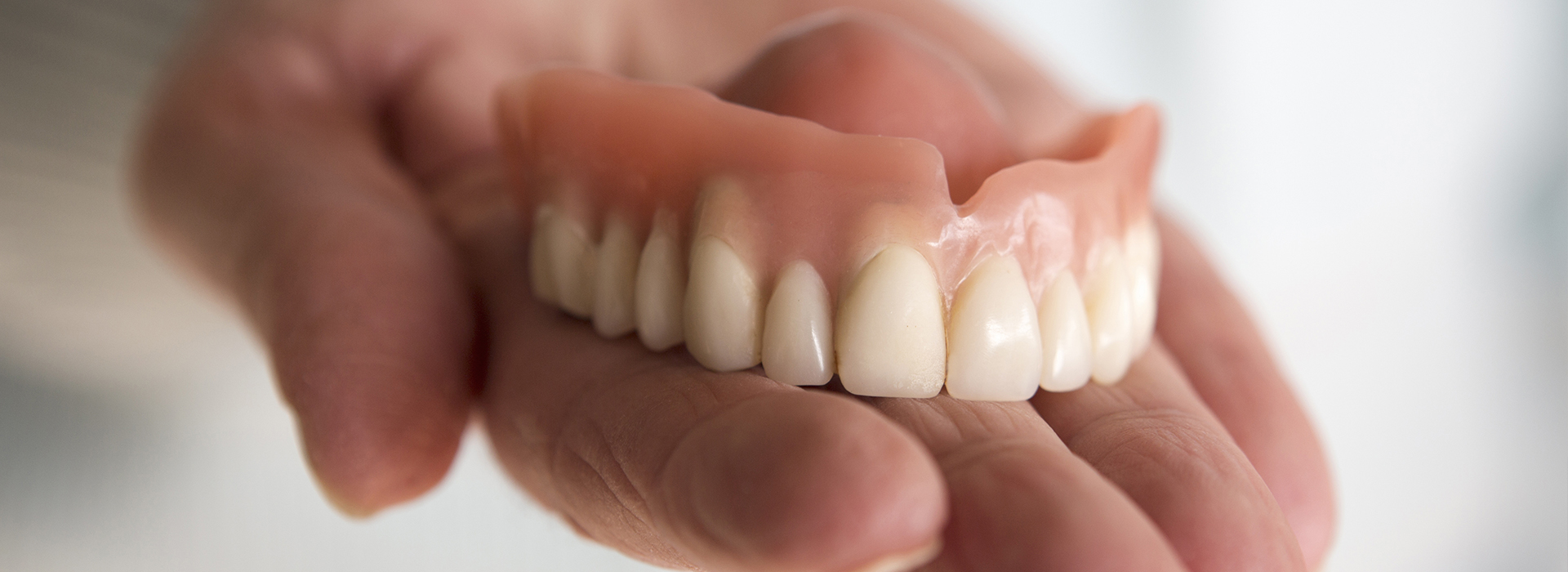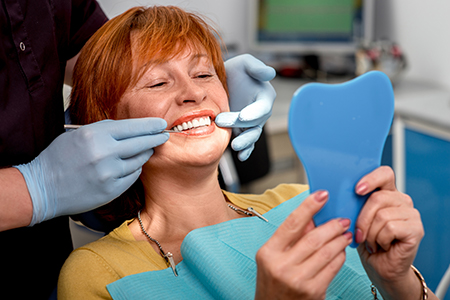
Modern materials and techniques have made replacing missing teeth more natural-looking and comfortable than ever. While dental implants and fixed bridgework are excellent, long-term options for many patients, removable dentures remain a reliable and versatile solution for restoring a complete, functional smile.
At Lesley Holloway the Dentist, we design dentures with attention to fit, appearance, and everyday comfort. Our approach balances practical function—helping you chew, speak, and smile—with an aesthetic that supports natural facial contours.
We believe in tailored treatments that respect each patient’s needs and lifestyle. Whether a patient requires a partial appliance to fill a few gaps or a full prosthesis to restore an entire arch, our team focuses on predictable outcomes and clear communication through every step of care.
Losing one or more teeth changes how the mouth works. Gaps can make it harder to chew certain foods and may alter the way you pronounce some words. Over time, those functional changes can influence nutrition, social confidence, and daily comfort.
Beyond function, tooth loss affects facial support. When teeth are absent, the jawbone and soft tissues beneath the cheek and lip can lose the stimulation they need to maintain shape, often resulting in a flatter or aged appearance. Replacing teeth helps preserve the structure that supports a youthful facial profile.
Left unaddressed, missing teeth can also shift the bite. Neighboring teeth may drift into open spaces, leading to uneven wear, bite problems, or increased risk of decay and gum disease around teeth that weren’t originally affected. Restoring missing teeth helps maintain the overall health and alignment of the mouth.
Because timing matters, we encourage patients to consider replacement options before adjacent teeth shift or significant bone changes occur. Even so, there are effective solutions for most situations—our office evaluates each case individually to recommend the best path forward.

Dentures are removable appliances that rest on the gums and recreate the look and function of natural teeth. They consist of prosthetic teeth set in a supportive base that conforms to the contours of the mouth. Because they can replace a few teeth or an entire arch, dentures suit a wide range of patients.
Partial dentures fill the spaces left by one or several missing teeth, relying on nearby natural teeth for support and retention. Full dentures replace all teeth in an upper or lower arch and rely on intimate contact with the gums and underlying tissues for stability. Both types are designed with attention to bite balance, appearance, and comfort.
For some patients, improved retention is achieved by combining removable dentures with dental implants or special attachments. These hybrid approaches increase stability while preserving the convenience of a removable prosthesis. During your consultation, we’ll explain which options provide the best function for your situation.
Choosing the right type of denture depends on how many natural teeth remain, the condition of those teeth, and the health of the gums and jawbone. Our planning process evaluates all of these factors so we can propose a solution that balances function, comfort, and long-term oral health.
Full denture solutions restore an entire arch and are tailored to the patient’s anatomy. There are variations designed to address different clinical needs and timelines, and our team will review the benefits and practical considerations for each approach.
Complete dentures replace all teeth in an arch and can be fabricated for placement after the gums have healed following extractions. Allowing tissues to mature before final fabrication often leads to a more precise and stable fit. In select cases, immediate dentures are provided so a patient leaves the office with teeth in place while healing continues—these often require later adjustments to maintain comfort.
Immediate denture
An immediate denture is placed at the time of extractions so patients are not without teeth during healing. Because the tissues will remodel after extraction, these appliances commonly need relines or adjustments as part of routine follow-up care.
Overdenture
An overdenture fits over remaining natural tooth roots or specially placed attachments to increase stability and preserve underlying bone. This option can enhance retention while maintaining removable care and hygiene.
Implant-supported denture
When implants are placed in the jaw, they provide secure anchor points for a denture, improving chewing efficiency and reducing movement. Implant-supported appliances are especially helpful for lower-arch restorations, where traditional denture stability is often more challenging.
Partial dentures replace specific missing teeth and use clasps or precision attachments to connect with adjacent natural teeth. Their primary goals are to restore appearance and chewing function while preventing nearby teeth from shifting into empty spaces.
Contemporary materials give partial dentures a more discreet profile and improved comfort. Depending on clinical needs, frameworks may be fabricated from cast metal, flexible resin, or hybrid materials that balance strength with a thinner, less noticeable design.
A well-designed partial denture supports the health of the whole mouth by stabilizing the bite and making daily care straightforward. We’ll help you select the material and design that best address your functional and aesthetic priorities.
At our office, we guide patients through the selection process and craft appliances that meet both daily demands and long-term expectations.

A successful denture starts with a thorough evaluation. We review medical and dental history, inspect the condition of remaining teeth and gums, and use diagnostic imaging when needed to understand bone structure and tissue contours. This comprehensive assessment guides a plan tailored to each patient.
From impressions to try-ins, every step affects fit and function. Careful attention to bite relationships, tooth position, and shade selection helps create a natural-looking smile that performs well. We communicate clearly about timelines and what to expect at each appointment so patients can participate in important decisions.
In some cases, preparatory procedures—such as smoothing bone, managing soft tissues, or extracting teeth—are required to create a stable foundation. Our team explains these recommendations and coordinates care to achieve the best long-term outcomes for prosthetic fit and oral health.
Whether a restoration requires a single visit or several appointments, precise technique and personalized adjustments ensure the denture serves your daily needs with confidence.

Receiving a new denture is a process of adaptation. Most patients notice improvements right away, but it’s normal to need some time to speak and chew naturally with a new appliance. Small adjustments in the early weeks help refine the fit and relieve any sore spots.
Easing into daily use
Start by wearing your denture for short periods and gradually increase wear time. If an area becomes sore, wearing the denture briefly until your adjustment appointment can help our team identify and relieve the pressure point.
Saliva and speech changes
An increase in saliva and slight changes to speech are common at first. These reactions subside as the mouth adapts. Practicing speech by reading aloud or conversing regularly accelerates the adjustment.
Eating with your dentures
Begin with softer foods and chew on both sides to distribute forces evenly. Over time, most patients regain a broad range of eating options. If certain textures remain difficult, consult us for adjustments or alternative strategies.
Cleaning and overnight care
Rinse dentures after meals and brush them daily with a denture brush or soft brush to remove food debris and plaque. Use recommended soaking solutions periodically to keep the appliance fresh and hygienic.
Maintain the health of any remaining natural teeth and soft tissues by brushing gums, tongue, and roof of the mouth gently. Oral hygiene supports overall comfort and helps prevent complications.
Remove dentures at bedtime to give tissues a rest. Soak them in water or a recommended cleanser while you sleep to protect the material and allow gums to recover.
When added retention helps
Some dentures benefit from supplementary retention methods such as adhesives, attachments, or implant support. If a denture moves excessively or causes discomfort, we’ll discuss options to enhance stability and confidence.
Ongoing maintenance
Periodic follow-up visits let us check fit, function, and oral health. Over time, relines or adjustments may be recommended to adapt to natural changes in the mouth and preserve comfortable function.
Our practice is committed to delivering durable, comfortable denture care. If you have questions about which solution fits your needs or what to expect during treatment, please contact our office for more information.
Dentures are removable prosthetic appliances that replace missing teeth and restore oral function. They consist of artificial teeth set into a supportive base that fits against the gums and underlying tissues. Well-designed dentures help with chewing, speech, and facial support while recreating a natural appearance.
At Lesley Holloway the Dentist we focus on fit, bite balance, and shade selection so dentures look and perform well in everyday life. The practice evaluates oral anatomy and remaining teeth to recommend the most appropriate denture type and materials. Clear communication about expectations and follow-up care helps ensure predictable outcomes.
Good candidates for dentures include people who have lost several or all teeth in an arch and who want a removable solution to restore function and appearance. Candidates should have healthy enough gums and underlying bone to support an appliance, or be willing to pursue preparatory care such as extractions or soft tissue management. Age alone is not a limiting factor; overall oral health and personal needs guide treatment decisions.
The practice assesses medical history, oral conditions, and prosthetic goals to determine suitability for full or partial dentures. Patients who prefer a nonfixed option or who require removable hygiene access often find dentures a practical choice. When needed, we discuss adjunctive measures such as tissue conditioning, relines, or implant support to improve outcomes.
Partial dentures replace one or several missing teeth and rely on adjacent natural teeth for support using clasps or precision attachments. Full dentures restore an entire upper or lower arch and depend on intimate contact with the gums and underlying tissues for retention. Implant-supported dentures use dental implants as anchors to increase stability and chewing efficiency while maintaining the convenience of a removable prosthesis.
Each option has different indications based on how many natural teeth remain, the condition of supporting tissues, and patient preferences for maintenance and stability. Partial designs can prevent adjacent teeth from drifting and maintain bite relationships, while complete dentures aim to recreate facial support and occlusion. Implant support is recommended when enhanced retention is necessary or when ridge anatomy makes traditional stability challenging.
The denture process begins with a comprehensive evaluation that includes medical and dental history, an oral exam, and diagnostic imaging when appropriate. Impressions, jaw relationship records, and shade and tooth selection follow, with try-in appointments to confirm fit and appearance before final fabrication. When extractions or preparatory procedures are needed, the timeline will incorporate healing periods to optimize tissue stability.
In some cases immediate dentures are provided at the time of extractions so patients leave the office with teeth in place, though these often require relines as tissues remodel. For final dentures, careful laboratory work and clinical adjustments ensure proper bite, esthetics, and comfort. We outline timelines and what to expect at each appointment so patients are informed and engaged throughout care.
Adjustment to a new denture varies by individual but most patients notice improvements quickly while experiencing an adaptation period of days to a few weeks. During the early phase you may encounter increased saliva, minor speech changes, and small sore spots as tissues adapt to the appliance. Regular follow-up visits allow the dental team to identify pressure points and make targeted adjustments.
Gradual increases in wear time, practicing speech, and starting with softer foods all help accelerate adaptation. If persistent pain, instability, or difficulty eating continues beyond the expected adjustment period, a clinical evaluation can determine whether relines, rebases, or other modifications are needed. Ongoing communication with your dental team ensures a comfortable transition.
Daily cleaning is essential for denture hygiene and oral health. Rinse dentures after meals to remove debris, brush them gently with a denture brush or soft brush and a nonabrasive cleanser, and soak them overnight in water or a recommended denture solution to keep the material hydrated and sanitary.
It is also important to maintain the health of any remaining natural teeth and oral tissues by brushing gums, tongue, and the roof of the mouth. Regular dental checkups allow the team to inspect the fit of the denture, check for wear or damage, and address tissue health to prevent complications. Handle dentures carefully to avoid drops and inspect them periodically for cracks or loose teeth.
Dentures can temporarily affect speech and chewing because the mouth must relearn tooth position and bite relationships. Slight changes in pronunciation and reduced chewing efficiency at first are common, but practicing speaking aloud, reading, and gradually reintroducing a wider variety of foods helps the brain and muscles adapt. Chewing on both sides of the mouth and cutting food into smaller pieces reduces strain while you gain confidence.
If particular sounds remain difficult or certain foods continue to cause slippage, a clinical adjustment to the denture or the addition of retention features may be indicated. The dental team can evaluate bite relationships and make refinements to tooth position or occlusion to improve function. Persistent problems should be addressed promptly to avoid uneven wear or tissue irritation.
Implant-supported dentures and overdentures use implants or retained roots as anchor points to significantly improve retention, reduce movement, and increase chewing efficiency compared with traditional tissue-supported appliances. Implants transfer functional load to the jawbone, which helps preserve bone volume and facial support over time. These hybrid approaches can be particularly beneficial for lower-arch restorations where conventional retention is often more difficult.
Not every patient is a candidate for implant support; successful planning depends on bone volume, general health, and treatment goals. During consultation we review the clinical advantages and surgical considerations so patients understand the steps involved. When indicated, combining implants with removable prostheses delivers a balance of stability and hygiene access that many patients find advantageous.
Periodic follow-up visits allow the dental team to evaluate fit, tissue health, and prosthesis condition and are important even when dentures feel comfortable. Early follow-ups after delivery help catch sore spots and verify bite relationships, while long-term checkups ensure the denture is adapting to any gradual changes in the mouth and that oral tissues remain healthy. The frequency of visits varies by individual, but routine annual or semiannual exams are common for monitoring.
Over time, dentures may require relines, rebases, or repairs to maintain optimal fit and function as the oral tissues change. The practice will discuss signs that indicate the need for maintenance, such as increased movement, sore spots, or visible wear. Timely care preserves the integrity of the appliance and supports overall oral health.
Provide a complete medical and dental history, including current medications, chronic conditions, allergies, and past oral surgeries or periodontal issues. Informing the dental team about habits such as tobacco use, bruxism, or any difficulties with previous prostheses helps guide appropriate treatment planning and material selection. Clear disclosure of expectations for appearance, function, and maintenance ensures the plan aligns with your lifestyle.
Discuss any concerns about surgery, healing time, or the desire for implant support so the practice can present realistic options and timelines. Sharing your daily routine and oral hygiene habits helps the team recommend a denture design and care plan you can maintain comfortably. Open communication before treatment leads to better outcomes and a smoother process throughout care.
Quick Links
Contact Us